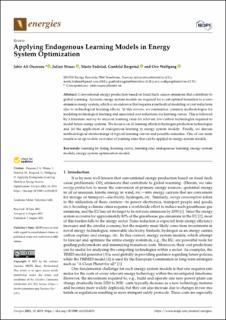Applying Endogenous Learning Models in Energy System Optimization
| dc.contributor.author | Ouassou, Jabir Ali | |
| dc.contributor.author | Straus, Julian | |
| dc.contributor.author | Fodstad, Marte | |
| dc.contributor.author | Reigstad, Gunhild Allard | |
| dc.contributor.author | Wolfgang, Ove | |
| dc.date.accessioned | 2022-07-20T08:17:44Z | |
| dc.date.available | 2022-07-20T08:17:44Z | |
| dc.date.created | 2021-08-10T11:55:53Z | |
| dc.date.issued | 2021 | |
| dc.identifier.issn | 1996-1073 | |
| dc.identifier.uri | https://hdl.handle.net/11250/3007160 | |
| dc.description.abstract | Conventional energy production based on fossil fuels causes emissions that contribute to global warming. Accurate energy system models are required for a cost-optimal transition to a zero-emission energy system, which is an endeavor that requires a methodical modeling of cost reductions due to technological learning effects. In this review, we summarize common methodologies for modeling technological learning and associated cost reductions via learning curves. This is followed by a literature survey to uncover learning rates for relevant low-carbon technologies required to model future energy systems. The focus is on (i) learning effects in hydrogen production technologies and (ii) the application of endogenous learning in energy system models. Finally, we discuss methodological shortcomings of typical learning curves and possible remedies. One of our main results is an up-to-date overview of learning rates that can be applied in energy system models | en_US |
| dc.language.iso | eng | en_US |
| dc.publisher | MDPI | en_US |
| dc.title | Applying Endogenous Learning Models in Energy System Optimization | en_US |
| dc.type | Peer reviewed | en_US |
| dc.type | Journal article | en_US |
| dc.description.version | publishedVersion | en_US |
| dc.rights.holder | The Authors | en_US |
| dc.source.volume | 14 | en_US |
| dc.source.journal | Energies | en_US |
| dc.source.issue | 16 | en_US |
| dc.identifier.doi | 10.3390/en14164819 | |
| dc.identifier.cristin | 1924988 | |
| dc.source.articlenumber | 4819 | en_US |
| cristin.ispublished | true | |
| cristin.fulltext | original | |
| cristin.qualitycode | 1 |
Tilhørende fil(er)
Denne innførselen finnes i følgende samling(er)
-
Publikasjoner fra CRIStin - SINTEF Energi [1649]
-
SINTEF Energi [1773]
